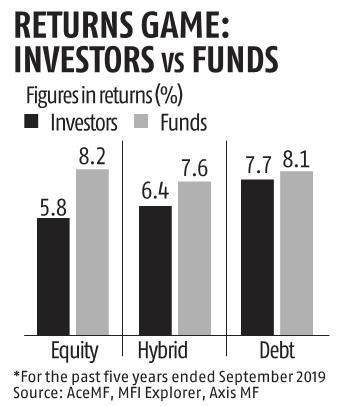Over a 16-year period, an analysis shows that investor returns were 6.3 percentage points lower than returns provided by equity funds, mostly on account of frequent churning by investors, an over-reaction to short-term market noise, and a focus on short-term performance.
To avoid this, follow a simple rule: Identify a good fund and stay with it through market cycles.
Ashley Coutinho reports.

Illustration: Dominic Xavier/Rediff.com
Frequent churning of portfolios is eating into returns that investors get from their funds.
The difference is stark especially for equity funds, and reached as high as 2.4 percentage points during the past five-year period, according to a recent study by Axis Mutual Fund.
While equity funds returned 8.2 per cent during the period under review, investor returns stood at 5.8 per cent.
Similarly, for hybrid funds, returns for investors were lower by 1.2 percentage points, while that for debt investors were lower by 0.4 percentage points.
The divergence is wider over a longer period.
For instance, over 16 years, investor returns were 6.3 percentage points lower than returns provided by equity funds.
The analysis used 'regular growth plan returns' for all actively managed diversified funds, for which data was available during the period.
All analysis was done using monthly AuM (assets under management) and returns data.
Fund returns represent the asset-weighted returns for all funds.
Investor returns represent the consolidated returns realised by all investors, adjusting for their inflows/outflows into individual schemes.
These were computed using an IRR (internal rate of return) approach, after calculating net sales into each fund.

Systematic Investment Plan returns are calculated based on investments made quarterly at the end of the month.
The lower returns were mostly on account of frequent churning by investors, an over-reaction to short-term market noise, and a focus on short-term performance.
"Investor flows are not stable but tend to follow market performance. As a result, their realised returns are much worse than what they would have achieved by using either simple buy and hold or systematic investment strategies. This effect is persistent across different time periods and shows that there has been little change in investor behavior over the last 15 years," the study notes.
Given a lack of forced savings programmes in India, there is an onus on investors to take regular decisions on deployment of discretionary savings.
While this gives the flexibility to investors to decide where their flows are allocated, investors may end up getting swayed by short-term market noise and keep chasing the latest outperformers.
"Over the longer term, investor returns are consistently lower than fund returns as a result of the frequent churn. Investors need to stay disciplined and focused on the long term while making allocations in order to get the best outcomes from their investments," said the study.
"Largely investors tend to buy looking at past returns. This may not be the ideal strategy since funds go through market cycles and investors may buy into the fund after a large part of the alpha has already been generated," said Kaustubh Belapurkar, director (fund research), Morningstar Investment Adviser India.
To avoid this mistake, Belapurkar suggests a simple rule: Identify a good fund and stay with it through market cycles.











